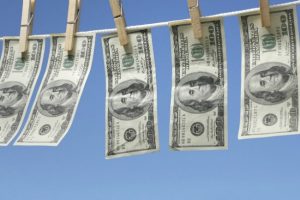 On 22nd September, Canada’s River Rock Casino Resort was rocked by an anti-money laundering scandal. The newly-elected British Columbia government dug out a buried year-old casino report, which raised some concerns regarding suspicious cash transactions at the River Rock Casino Resort in Richmond. According to the report, the casino accepted over $13.5m in $20 bills in just one month. Apart from that, the report revealed that the big flow of “unsourced” cash did not disturb the casino workers, who willingly accepted the big amounts of small bills.
On 22nd September, Canada’s River Rock Casino Resort was rocked by an anti-money laundering scandal. The newly-elected British Columbia government dug out a buried year-old casino report, which raised some concerns regarding suspicious cash transactions at the River Rock Casino Resort in Richmond. According to the report, the casino accepted over $13.5m in $20 bills in just one month. Apart from that, the report revealed that the big flow of “unsourced” cash did not disturb the casino workers, who willingly accepted the big amounts of small bills.
Canada’s financial watchdog Financial Transactions and Reports Analysis Centre (FINTRAC) announced that it is to review the report and determine an appropriate plan of action. FINTRAC Regional Compliance Manager Robby Judge found out that nearly 80% of the casino employees lack the needed knowledge of money laundering indicators.
Money Laundering Tentacles Spread Much Deeper
 According to a statement by the Royal Canadian Mounted Police (RCMP), the failure of some gambling facilities to enforce an adequate and working anti-money laundering framework have supported the work of the wrongdoers. In April this year, Gaming Enforcement Branch’s Director of Compliance Len Meilleur has written a memo, which was addressed to RCMP and B.C. Lottery Commission. This week, Canada’s Postmedia obtained a confidential memo from Canada’s Gaming Policy Enforcement Branch. In it, Mr. Meilleur has voiced concerns regarding the threat of the presence of organized criminal networks in the country’s gambling life. He referred to it as “a viable threat to public safety”.
According to a statement by the Royal Canadian Mounted Police (RCMP), the failure of some gambling facilities to enforce an adequate and working anti-money laundering framework have supported the work of the wrongdoers. In April this year, Gaming Enforcement Branch’s Director of Compliance Len Meilleur has written a memo, which was addressed to RCMP and B.C. Lottery Commission. This week, Canada’s Postmedia obtained a confidential memo from Canada’s Gaming Policy Enforcement Branch. In it, Mr. Meilleur has voiced concerns regarding the threat of the presence of organized criminal networks in the country’s gambling life. He referred to it as “a viable threat to public safety”.
Mr. Meilleur’s warnings appear to be based on real facts. A report by the RCMP suggests that an illicit banking network, allegedly operated by Paul “King” Fun, lends money to visitors from the Chinese mainland to gamble. But that is not the most disturbing part. It was revealed that the underground network is linked to drug dealers in Mexico and Peru. According to the report, the unlawful banking network has also access to bank accounts in Iran, which provokes RCMP to consider that the problem is rooted even deeper, suspecting terrorist financing.
Most Common Profession among VIP gamblers
 Here it might be interesting to shed a light on the most common professions among the most regular VIP rollers. A gambling study showed that most of the regular high-rollers at Richmond’s River Rock Casino in 2015, who are involved in the allegedly suspicious cash transactions work in the real estate sector. They spent $53.1 million in total on buy-ins at River Rock Casino, while the actual number of the VIP “real estate” patrons is 135.
Here it might be interesting to shed a light on the most common professions among the most regular VIP rollers. A gambling study showed that most of the regular high-rollers at Richmond’s River Rock Casino in 2015, who are involved in the allegedly suspicious cash transactions work in the real estate sector. They spent $53.1 million in total on buy-ins at River Rock Casino, while the actual number of the VIP “real estate” patrons is 135.
Coming as no surprise, the second most common high-rollers are “Business owners” with 86 patrons and $38.5 million “invested” in the River Rock Casino. The third group of VIP gambler at River Rock is involved in the “Construction” sector. They enter the competition of the “Most Common Profession among High-Rollers” with 56 patrons, who accounted for $33.8 million in cash buy-ins. The revelation also showed that a great number of housewives and student also enjoy the high stakes games. Speaking of the most common profession, it is fair to mention also the rarest. The B.C. casino welcomed only 6 patrons involved in the “Petroleum” industry. They spent a total of $6.1 million within the casino borders.
The memo also did not exclude the opportunity that these high-rollers are acting like “nominees”. This means that they are not the real source of the money, but a third person, whose personality remains hidden. The memo also unveiled that most of the suspicious transactions come from gamblers from China. Hence, it is hard to track their backgrounds as these players presented themselves with the English variation of their Chinese names. According to Postmedia, the Canada Revenue Agency is working hand-in-glove with the RCMP on the case. They will investigate alleged money laundering in B.C. casinos.
British Columbia’s Anti-Money Laundering
 Postmedia reported that Paul “King” Fun drew the attention of the British Columbia Lottery Corporation (BCLC) for the first time in 2012. Here, it should be explained that British Columbia’s casinos do not file suspicious transaction reports directly to FINTRAC, but to BCLC, which is responsible for alerting FINTRAC. Failing to ensure that the gambling operations remain compliant with the country’s legal framework, the newly-elected government announced that it is to reconsider BCLC’s responsibilities.
Postmedia reported that Paul “King” Fun drew the attention of the British Columbia Lottery Corporation (BCLC) for the first time in 2012. Here, it should be explained that British Columbia’s casinos do not file suspicious transaction reports directly to FINTRAC, but to BCLC, which is responsible for alerting FINTRAC. Failing to ensure that the gambling operations remain compliant with the country’s legal framework, the newly-elected government announced that it is to reconsider BCLC’s responsibilities.
BCLC, on the other hand, proposed to enhance British Columbia’s anti-money laundering framework to efficiently fight dirty money. It was announced that BCLC gradually started to shift to a new non-cash system, including bank drafts and electronic fund transfers. BCLC explained that the corporation is fully committed to supporting anti-money laundering initiatives in an attempt to weed out illegal practices.
But it should be noted that overregulations may have a negative impact on the development of the casino trade within the Canadian province. We have already witnessed similar scenarios of regulators imposing too severe anti-money laundering measures. A vivid example is Macau’s casino industry, which struggled to survive after China launched a crackdown on money laundering activities. This resulted in many regular high-stakes gamblers to re-direct their attention, leaving Macau’s once thriving gambling industry threadbare.
Supposing that Canada embarks on a money-laundering-hunt with too strict regulations, that will, most likely, trigger an exodus of high-end players. Soon it is to be revealed in what way the country is to fight the problem and how deep it is rooted in fact. At present, the terrorist financing network remains an allegation and nothing is approved.



















